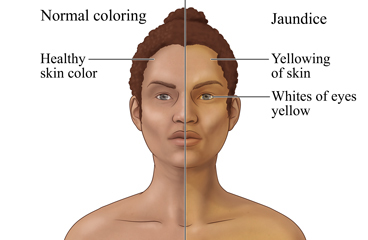
Overview
Jaundice is yellowing of your skin and the whites of your eyes. It's caused by a pigment, or coloring, called bilirubin. This comes from the breakdown of red blood cells. When your liver is healthy, it removes the pigment from your blood. But if the liver isn't working right, pigment can build up in the blood. Then it can get into the skin and other tissues.
Many diseases can cause jaundice. These include hepatitis, gallstones, and cancer of the pancreas. Liver damage from heavy drinking over a long time can also cause it. Some medicines can cause jaundice. And jaundice can be caused by the rapid destruction of red blood cells (hemolytic anemia).
The treatment for jaundice depends on the cause. You may need medicine to treat an infection. Or you may need to have your gallbladder removed. Some people need to stop drinking alcohol. If another disease is causing jaundice, treating the disease usually takes care of the jaundice. If a medicine you take is causing jaundice, your doctor may switch you to another one.
Follow-up care is a key part of your treatment and safety. Be sure to make and go to all appointments, and call your doctor if you are having problems. It's also a good idea to know your test results and keep a list of the medicines you take.
How can you care for yourself at home?
- Follow your doctor's general advice for how to take care of yourself. Rest when you need it. Eat a variety of healthy foods. And drink plenty of water (unless your doctor tells you not to).
- Avoid alcohol. Your doctor may say to not drink any alcohol until your jaundice is gone. If your jaundice is caused by drinking alcohol, talk with your doctor if you need help to quit. Counseling, support groups, and sometimes medicines can help.
- Be safe with medicines. Do not take any other medicine without talking to your doctor first. This includes over-the-counter medicines, vitamins, and herbal products.
- Make sure your doctor knows all the medicines you take. Some medicines, such as acetaminophen (Tylenol), can make liver problems worse.
- If you have itchy skin, taking warm baths and putting moisturizing creams on your skin may help. If this doesn't help, talk to your doctor about medicines that can be used for itching. Follow the instructions on the label.
- If itching affects your sleep, ask your doctor if you can take an antihistamine that might reduce itching and make you sleepy, such as diphenhydramine (Benadryl). Read and follow all instructions on the label.
When should you call for help?
Call 911 anytime you think you may need emergency care. For example, call if:
- You have severe trouble breathing.
- You passed out (lost consciousness).
Call your doctor now or seek immediate medical care if:
- You are confused, or your confusion gets worse.
- You have a fever or chills.
- You have severe pain or swelling in your belly.
- You are losing weight without trying.
- You are vomiting or feel sick to your stomach.
- Your urine is dark yellow-brown, or your stools are light-colored.
Watch closely for changes in your health, and be sure to contact your doctor if:
- You do not get better as expected.
Current as of: October 7, 2025
Author: Ignite Healthwise, LLC Staff
Clinical Review Board
All Ignite Healthwise, LLC education is reviewed by a team that includes physicians, nurses, advanced practitioners, registered dieticians, and other healthcare professionals.

